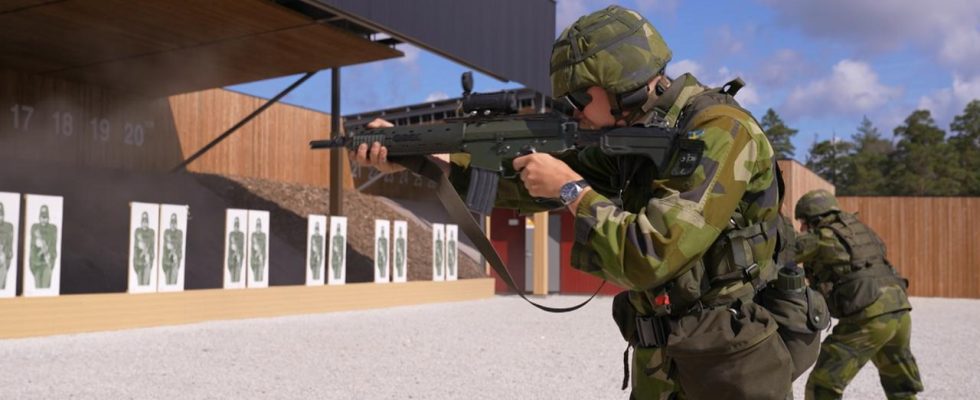europe magazine
Sweden is preparing to join NATO. This brings a number of advantages to the military alliance – above all control of the Baltic Sea, from which Germany can also benefit.
Aim, fire, three shots per stop – as precise as possible. 19-year-old William Landqvist shoots a Bofors AK-5C machine gun at the paper silhouette of an imaginary enemy. The exercise is part of the training of conscripts with the Swedish Army’s Gotland Regiment P18.
William Landqvist has volunteered for armed service: “I just see it as a great asset to be able to defend Sweden against an armed attack,” he says. “I want to be there, that’s the most important thing for me. And now I’m here and it feels good.”
Sweden introduced conscription in 2018, but constraint is often not necessary, as many young Swedes have volunteered since it was introduced. There seems to be a great awareness in the country that national defense is important. “That has changed enormously,” says Anders Malm, the deputy regiment commander of the Gotland Regiment P18: “There is a clear understanding that defense is necessary and that the Swedish armed forces are doing a good job.”
The Home Guard, a stand-by army within the Swedish armed forces, is also very popular: the number of applicants has doubled in the past two years.
Strategic advantage: the hinterland
Should Sweden join NATO, the military attitude of the population would be a great advantage for the alliance, says military expert Johannes Peters from the Institute for Security Policy in Kiel.
It contributes to the deterrence potential, because Sweden, like Finland, would be able to very quickly recruit well-trained reservists in the event of war, who would then be available: “That’s something that we in Germany have thoroughly forgotten here. At the latest with With the abolition of conscription, the Bundeswehr has almost completely disappeared from the collective consciousness of Germany.”
Ever since Russia invaded Ukraine, Sweden has wanted to join NATO. Accession is now considered very likely. All NATO countries must agree if a new country is to be admitted.
Turkey has long opposed Sweden’s accession. But at the NATO summit in Lithuania in July, Recep Tayyip Erdogan pledged to support Sweden’s accession. In autumn it could be so far.
William Landqvist has volunteered for military service – and Sweden’s armed forces have no problems recruiting new recruits.
Strategically, Sweden’s vast hinterland offers an advantage for NATO. For example for flight routes – the north side of the Baltic Sea to the Arctic would be a self-contained NATO area.
It is precisely this advantage that the US military recently emphasized during an exercise in Scandinavia: “The ability to transport equipment, soldiers, ammunition and supplies quickly, organized and efficiently is really important,” said Gregory Anderson, Major General of the US Army. “Whether ports, airfields, railways or highways – all these things are of importance for warfare.”
The “Sun Island” is upgraded
This is particularly evident on Gotland. Actually, it is considered the sun island of the Swedes – the most popular holiday area. It was fully demilitarized by 2018, but is now being upgraded again. It is said that whoever controls Gotland also controls the Baltic Sea.
The reason for this is the central location of the second largest island: It lies off the west coast of Sweden like a huge aircraft carrier, says Anders Malm. “Once you have Gotland under control, you can ensure that you have free passage on the Baltic Sea with your own formations, your own units and also with civil shipping or aviation.”
Deputy commander Anders Malm observed a “clear awareness” of the importance of defense among the Swedes.
In the dispute with Russia, the Baltic Sea in particular is an area of tension. Just recently, Russian President Vladimir Putin presented his fleet at a parade in front of Saint Petersburg: 45 ships, submarines and 3,000 marines.
In the event of a conflict, Sweden’s entry into NATO could help. Because the country has state-of-the-art submarines. In the narrow Baltic Sea, they could be decisive for the war. “That’s an immense advantage,” says military expert Peters, “because control over the Baltic Sea would be gained underwater, since ships sailing on water can always be detected in the small Baltic Sea and are therefore also vulnerable.”
But from now on, the Swedish submarine fleet would be an advantage for NATO. Especially for Germany. Because the ships are perfectly adapted to the shallow waters of the Baltic Sea, that is a rare ability. They help with reconnaissance: “Until now, from a NATO perspective, only Germany had these capabilities,” says military expert Peters.
The German Navy has so far “shouldered the entire burden of the NATO submarine presence in the Baltic Sea.” If Sweden were to join, “the Swedish qualities would come into the portfolio”. The German navy in particular would benefit from Sweden joining the defense alliance.

